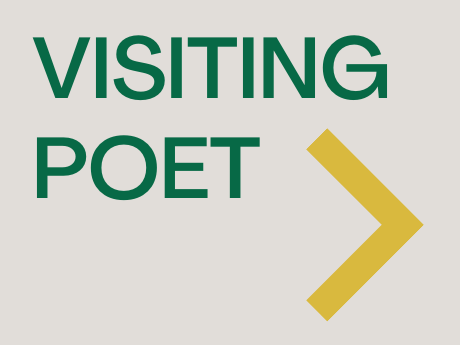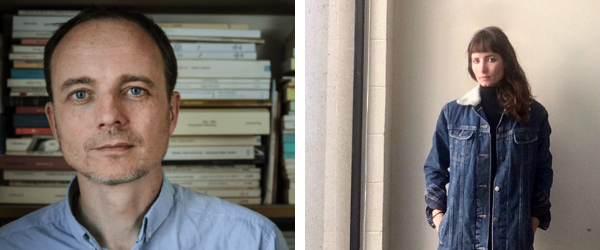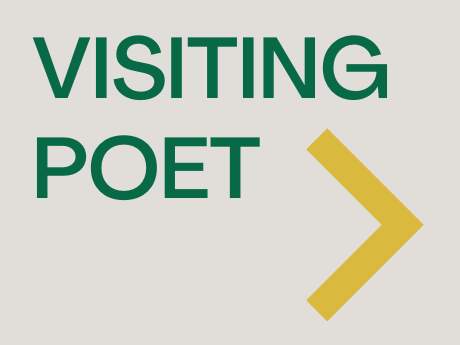Visiting Poet
Visiting Poet: Lindsay Turner on Stéphane Bouquet

from The Next Loves
from The Next Loves: I
His look and it took maybe 3
hello / seconds
only his head underneath the blue hoodie
he takes off
because the rain is stopping look here’s
the planner’s confirmation and
someone’s holding an imaginary map of the conversation we’ll say
that and that
the streets will be all orderly
if I stay close inside
the zones he surveys
but it isn’t easy
imagining that the table and the lamp and the evening
sound like his breathlessness when he uncovers me and cleans
from The Next Loves: V
Red t-shirt and husky voice
we do yoga together much less strong
than I am but so much more beautiful
at the end in savasana when we’re supposed to become
one of those vibrations in the air and the ritual bell
sets us
almost behind absence I can only
think like an animal to live oh oh
oh that long slim desire
stretched out 2 meters away if I
rolled over on him really would that from now on be the only
hope of slowing
because of the sweetness in your bones
the quickness of death against which I recite a rose
is a rose is a rose is a rose
from The Next Loves: X
And then afterwards we left
together & by car he drives
the icy sun strikes villages painted blue-gray
impossible to park anywhere safe
for four nights running we can’t just
leave it / hop on the train he loves the highway
is empty the gps in charge of the way we talk about
the climate conference Cancun
yadda yadda it all sounds like his voice
and here’s the unexpected story
once upon a time 1 & 1
are given a some time together the same air
carried within a little metal shell itself as fragile
and itself as easy to crush
from The Next Loves: XIII
In the film Casey
Affleck knocks out his girlfriends with his fists
& kills them I’m sitting
next to Kenneth
but it’s no good jumping on him he’ll just
squirm out with a smile in the film
we’re told that a house is
peaceful if the chairs
are pulled up around the table &
the eggs are sizzling in the skillet & there’s someone
we draw closer like trusting little rabbits
and he kills us and the house was quiet
and the world
was calm
Translated from the French by Lindsay Turner.
Poems originally appeared in Oversound. Reprinted with the permission of the translator.
In this new series, we introduce readers to poets from around the world through a selection of poems and a brief essay on their life and work.
I first encountered Stéphane Bouquet and his work at a June 2014 poetry reading in a tiny bookstore in Paris’s quiet 20th arrondissement, to which I had been invited by a friend of another reader. Stéphane Bouquet is a poet, translator, film critic, screenwriter, dancer, and choreographer. Born in Paris in 1968 to a French nurse and an American GI father he never met, Bouquet works across disciplines, genres, media, and even literary traditions. After studying economics at university, Bouquet went on to jobs as a culture journalist and writer for France’s esteemed Cahiers du Cinéma.
It has always been hard for me to listen to poetry in French and understand much. But with Bouquet, as cheesy as it sounds, I realized that I was feeling some kind of poetic kinship. Actually, I think he was reading prose, work from his 2007 collection Un Peuple. In this work there were people and things: Emily Dickinson, John Keats, a flowing stream, a rouge-gorge (“red-throat,” or red-breasted robin). I recognized a way of thinking about literature not as the domain of ideas or metaphysics, but as part of the physical world. Although at that point I had published no translations, I approached Bouquet after the reading and muttered something about wanting to translate his poetry. Because Bouquet is gracious and kind, we became friends, and that summer I began working on his most recent collection at the time, The Next Loves.
Bouquet’s style is at once intensely literary and remarkably approachable. Writing in the New York Times, critic David Orr praised Bouquet’s work for its “conversational immediacy” and its “wry soulfulness.” Formally innovative and ranging from intricately wrought sonnets to long sequential poems in long lines to prose musings and dramatic constructions, Bouquet’s writing explores contemporary urban life and interpersonal relationships. As Garth Greenwell writes of his formal and thematic variety, Bouquet “unites technologies ancient and new—cruising, Facebook, Grindr, the sonnet—to make poems of indefatigable sweetness, freshness, and insight.” His poetry might be seen to bridge the energies of American poetry, especially the New York School (he has translated Paul Blackburn, Robert Creeley and James Schuyler), with the European tradition, combining an ebullient attention to the quotidian details of ordinary life, a new vista of gay desire, and an ear and eye for the workings of a society marked by global distance and inequality.
These two strands of verse, U.S. and European, are woven together seamlessly to make up the rich material and emotional texture of Bouquet’s poetry. On the one hand, Bouquet has spoken of finding his way to poetry in the first place only upon encountering American poets like Frank O’Hara and James Schuyler, who gave him permission to incorporate the accidents and vocabularies of daily life and gay sexuality into his poems, leaving the rarified air that has perhaps marked some French and European poetic production.
On the other hand, Bouquet’s work expands the work of earlier American poets in scope and emotion, moving beyond their geographical, historical, and emotional centers. His poetry is peppered with allusions to European poets such as Friederich Hölderlin, Ranier Maria Rilke, and Pierre Ronsard and draws on a variety of high literary devices, from the sonnet forms mentioned above to a range of older European forms of address and poetic postures (the poet as yearning lover, the poet as learned observer, the poet as tragic outcast). The resulting affect is uniquely mixed, split between joy and delight and melancholy and unshakable graveness.
In her citation for the inclusion of The Next Loves on the 2020 Best Translated Book Award longlist, Laura Marris speaks of Bouquet’s “rhapsodic and difficult tenderness.” His poems, she writes, “are both electric and grounded, acknowledging the hope that comes from wanting something, while also admitting the effects of heartbreak—the half-life of desire that permeates the interior world of this book.” Such an emotional range is fitting for the topics Bouquet tackles: even as he grieves over the wake of the AIDS epidemic and reckons with contemporary problems such as global economic precarity or the alienation and disconnection that can accompany our technologically mediated connections, he also constantly celebrates new lovers, loves, and possibilities for human commonality and community.

Stéphane Bouquet published his first collection of poems, Dans l’année de cet âge, in 2001 and has since published eight more collections with France’s Champ Vallon Éditions (including, most recently, Vie commune in 2016 and Le Fait de vivre in 2021), as well as a book of essays on poetry, La Cité de paroles, published by Éditions Corti in 2018. His 2013 collection Les Amours suivants appeared in English in 2019 as The Next Loves (Nightboat Books, translated by Lindsay Turner); a second English collection, Common Life, is forthcoming in 2022. His honors and awards include a 2003 Prix de Rome and a 2007 Mission Stendhal Award. His work on film includes books on the filmmakers Pier Paolo Pasolini, Gus Van Sant, and Sergei Eistenstein. With Sébastien Lifshitz, Bouquet co-wrote the classic gay films Come Undone (2000) and Wild Side (2004). He has led workshops for choreographers at the Centre National de la Danse in Paris and for actors and stage directors at La Manufacture in Lausanne, Switzerland. He currently lives and works in Paris.
Lindsay Turner is the author of the poetry collection Songs & Ballads (Prelude, 2018) and the poetry chapbook Fortnights (Doublecross Press, forthcoming). Her translations of contemporary Francophone poetry and philosophy include books by Stéphane Bouquet, Souleymane Bachir Diagne, Anne Dufourmantelle, and Ryoko Sekiguchi, among others. Originally from northeast Tennessee, she lives in Denver, where she is Assistant Professor in the Department of English and Literary Arts at the University of Denver.

